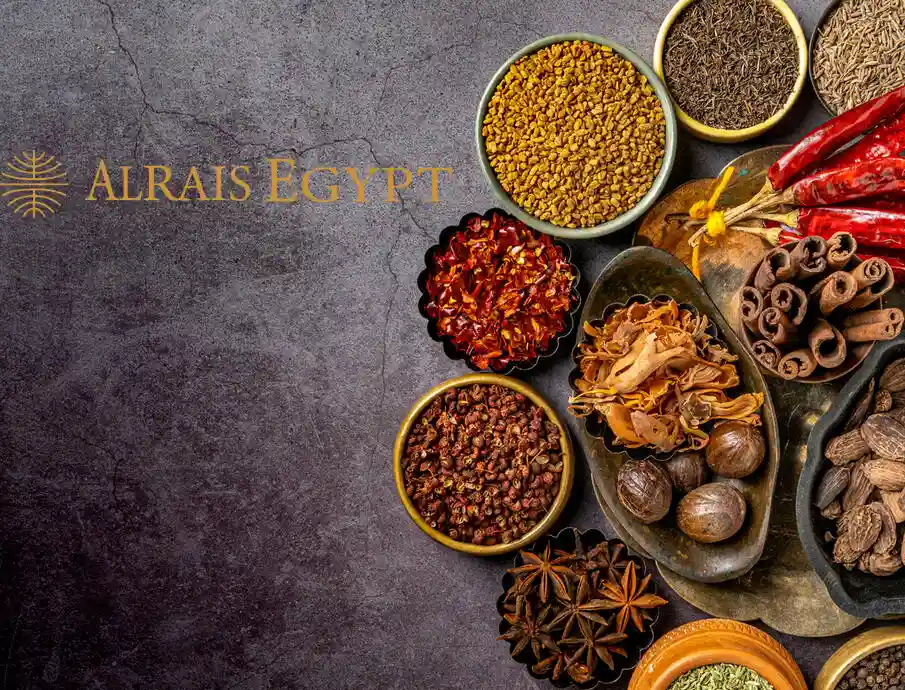Egypt has long been one of the most sought-after regions for high-quality import spices. From the fertile lands of the Nile Delta to the sun-soaked farms of Upper Egypt, the country is known for its premium agricultural products, including cumin, coriander, anise, fennel, black seeds, hibiscus, and more.
As global demand for natural and authentic spices increases, more businesses are turning to Egypt for bulk imports. But for new buyers Al Rais Egypt is the best spices export in the Egypt, the process may seem complex. This guide breaks it down step by step, so you can start importing spices from Egypt with confidence and clarity.
Why Import Spices from Egypt?

Egypt is not only rich in agricultural heritage but also strategically positioned for trade. Here are a few reasons why importing spices from Egypt is a smart business decision:
- Ideal Climate for Spice Cultivation
Egypt’s climate supports a wide variety of spice crops, ensuring consistency in quality and supply.
- High Global Demand
Egyptian spices are widely appreciated for their aroma, taste, and potency.
- Competitive Pricing
Egypt offers premium products at highly competitive export prices.
- Strong Export Infrastructure
With seaports like Alexandria and Damietta and established export procedures, logistics are smoother than many other sourcing countries.
- Compliance with International Standards
Reputable Egyptian exporters offer products that meet global quality certifications, making customs clearance and import approvals easier.
Step-by-Step Guide to Import Spices from Egypt
Step 1: Identify Your Spice Requirements
Begin by determining the specific spices you wish to import. This may include:
- Whole or ground cumin
- Coriander seeds
- Fennel seeds
- Anise
- Black seeds (Nigella sativa)
- Hibiscus
- Bay leaves
- Caraway
Define the quantity, quality standard, and packaging preferences (e.g. 25 kg PP bags or custom branding).
Step 2: Find a Reliable Egyptian Exporter
Choose a supplier with a strong reputation for consistent quality, timely delivery, and transparent communication.
What to look for in an exporter:
- Years of experience in spice exports
- Export to countries with strict regulations (EU, USA, Gulf, etc.)
- Availability of international certifications
- Ability to provide samples before bulk orders
- Clear documentation and labeling
Alrais Egypt, for instance, is a trusted name in exporting Egyptian herbs and spices in bulk quantities to Europe, Asia, and the Middle East.
Step 3: Request Samples and Confirm Quality
Before placing a bulk order, request samples of the desired spices. Evaluate the:
- Color and freshness
- Aroma and flavor intensity
- Purity (free from dust, stems, or foreign particles)
- Moisture content (affects shelf life and compliance)
Professional exporters will provide laboratory test results upon request.
Step 4: Understand the Required Certifications
When importing spices, many countries require compliance with specific food safety and agricultural regulations. Reliable exporters in Egypt can provide:
- COA (Certificate of Analysis)
Verifies product quality, moisture content, and microbial safety.
- Phytosanitary Certificate
Issued by the Egyptian Ministry of Agriculture to certify that the shipment is free from harmful pests or plant diseases.
- Certificate of Origin
Proves that the goods were produced in Egypt, which may qualify the shipment for tariff exemptions in certain countries.
- ISO Certification (ISO 22000 / ISO 9001)
Confirms the exporter follows internationally recognized food safety or quality management standards.
- Organic Certification (if applicable)
For buyers seeking certified organic spices, exporters must provide documentation from accredited organic bodies (like USDA or EU Organic).
Make sure you share your country’s import requirements with the exporter early in the process. CHECKOUT ALRAIS Egypt Certifications
Step 5: Negotiate Terms and Finalize the Contract
Discuss and agree on the following:
- Quantity and price (FOB or CIF)
- Delivery timeline
- Payment terms (T/T, L/C, etc.)
- Packaging and labeling requirements
- Responsibility for documentation and customs clearance
Get everything in writing via a formal sales contract to protect both parties.
Step 6: Shipping and Logistics
Depending on the agreement, the shipment may be handled FOB (Free on Board) or CIF (Cost, Insurance, and Freight). Trusted exporters typically handle the entire logistics process including:
- Preparing export documentation
- Coordinating with freight forwarders
- Ensuring proper packing for export
- Meeting port deadlines
Transit times vary based on your location:
- Europe: 10–15 days
- Gulf: 7–10 days
- Asia: 15–25 days
- North America: 20–30 days
Step 7: Customs Clearance and Import Duties
Once the goods arrive at your port, the importer is responsible for:
- Clearing customs
- Paying import duties and taxes (if applicable)
- Arranging inland transportation
Your local customs broker can assist with this process. Be sure to have all the original documents from the exporter ready.
Importing spices from Egypt offers numerous advantages for international buyers—ranging from high quality and affordable pricing to dependable logistics. By choosing a trusted exporter, requesting the right certifications, and understanding the end-to-end process, your spice import journey can be smooth, safe, and profitable.
Follow us on linkedin for more info
FAQs
What are the most exported spices from Egypt?
The most commonly exported spices include cumin, coriander, fennel, anise, hibiscus, black seeds, and caraway.
How long does it take to import spices from Egypt?
Shipping times vary by destination: about 10–15 days to Europe, 7–10 days to Gulf countries, and up to 30 days to North America.
What documents are needed to import spices?
Essential documents include Certificate of Analysis, Phytosanitary Certificate, Certificate of Origin, packing list, and bill of lading.
Can I import organic spices from Egypt?
Yes. Many exporters in Egypt are certified to provide USDA or EU Organic certified spices upon request.
